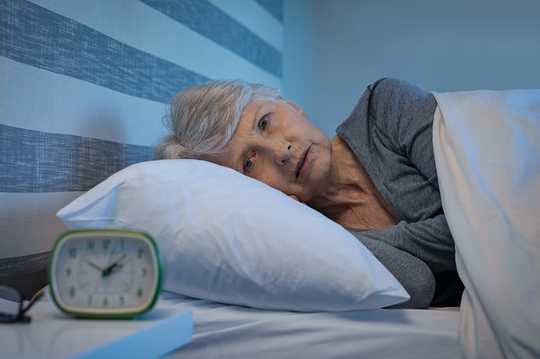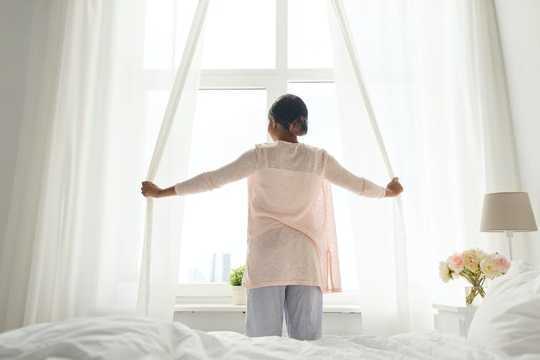 A good quality sleep of a sufficient duration is essential to being able to function well both physically and mentally. (Shutterstock)
A good quality sleep of a sufficient duration is essential to being able to function well both physically and mentally. (Shutterstock)
The crisis created by the COVID-19 pandemic has resulted in a generalized climate of anxiety, which has increased stress levels and which can lead to insomnia even in people who do not usually suffer from it. While it is true that good sleep is essential to health in normal times, it becomes even more so in this period of confinement.
Sleep is a natural recurrent state of unconsciousness from the outside world, accompanied by a progressive decrease in muscle tone that occurs at regular intervals.
The average human spends one-third of their life sleeping. Sleeping well is essential for many good reasons. Sleep of good quality and of sufficient duration is essential to being mentally and physically functional.
Conversely, poor sleep can gradually put a person at risk. Lack of sleep, whether or not it is caused by a physiological or behavioural disorder, increases obesity, reduces immunity, impairs job performance, memory and many other functions.
Get The Latest By Email
In my research in sleep medicine and social epidemiology, I analyze sleep disorders in atypical cases, such as people with Parkinson’s disease, call centre and customer service workers or video game players.
Here are 10 recommendations to promote sleep, based on both my observations and the scientific literature:
1. Establish a regular schedule. Regular bedtime and wake-up times will help you maintain a healthy sleep routine.
2. Keep in contact with natural light. Open your windows and expose yourself to sunlight as much as possible. This can be good for improving your mood and regulating your body clock. In addition, it is an opportunity to get some fresh air in a controlled manner for a short period of time.
 Don’t stay in bed if you’re having trouble sleeping. Get up, engage in a relaxing activity and go back to bed when signs of sleepiness appear. (Shutterstock)
Don’t stay in bed if you’re having trouble sleeping. Get up, engage in a relaxing activity and go back to bed when signs of sleepiness appear. (Shutterstock)
3. Maintain daily physical activity. Staying active during social distancing helps you build up enough body fatigue to fall asleep more easily and get a deeper sleep.
4. Limit naps. Unless you have had very little sleep the previous night, it is important to avoid sleeping during the day or in the afternoon, as this reduces sleep pressure and increases the risk of insomnia.
5. Maintain a social life. Bad news in the media can create anxiety. It is important to use your online social networks to seek support from friends and family to keep your spirits up and maintain your mental health. This is especially important when living alone or away from family.
6. Be disciplined in your diet. Avoid drinking coffee in the afternoon as it can cause nervousness and delay sleep in the evening. Eating large, overly rich meals before going to bed can also delay sleep. Some people have no problem sleeping, even if they drink a lot of coffee and eat a lot. It is nevertheless recommended to control the quantities and times of consumption during the day because anything in excess may harm sleep.
 Exposure to natural light is not only good for your mood, it also helps regulate your body clock. (Shutterstock)
Exposure to natural light is not only good for your mood, it also helps regulate your body clock. (Shutterstock)
7. Avoid backlit devices before bedtime. New technologies are an integral part of our lives and we’re all a little addicted to our smartphones, tablets and laptops. It is absolutely important to set them aside at least 30 minutes before your scheduled sleep time. If you’re worried you won’t be able to do that, you can set the device to “night mode” to reduce its brightness. By reducing the brain’s lag with the natural cycle of day and night, this will prevent disturbances in the biological clock and will be beneficial for the quality of sleep in the long term.
8. Avoid staying in bed if you don’t sleep. The brain is like a computer, which associates certain events with certain functions. The brain will associate bed and darkness with sleep and trigger the whole process of falling asleep. The brain will not be able to do this if it is distracted by other activities such as video games, homework, physical activity and alcohol. It is best to read a book, listen to soft music, do deep breathing exercises or yoga, or any other relaxing activity. Do not stay in bed for more than half an hour after going to bed if you are not sleeping. When sleep is delayed, it is best to get out of bed, do a quiet activity, and return to bed only when signs of fatigue — heavy eyelids, yawning, etc. — appear.
9. Accept that not all our nights of sleep are perfect or restful. We are all subject to stress and each of us has our own stress management techniques. We must avoid worrying if we haven’t slept well for a few days. Before you get upset about poor sleep, I suggest you review the eight recommendations above. Often, people have trouble sleeping because of a trivial problem, an argument with a loved one, or work-related anxiety. Identifying your stress and learning how to manage it is a good start.
10. Avoid sleeping pills. Generally, the easy solution is the one that carries the most risk. Prolonged use of sleep aids, such as benzodiazepines or anxiolytics, without consulting health-care professionals could worsen a situation that was not initially serious. It is better to adopt a healthy lifestyle than to resort to medication, both in normal situations and during confinement due to COVID-19.
Remember that to be able to work effectively, eat healthily, have fun, pay bills and take care of your loved ones, in normal times or during periods of confinement, you need to sleep well!![]()
About The Author
Faustin Etindele, Sleep medicine & Social epidemiology fellow, Université du Québec à Montréal (UQAM)
This article is republished from The Conversation under a Creative Commons license. Read the original article.
books_health







